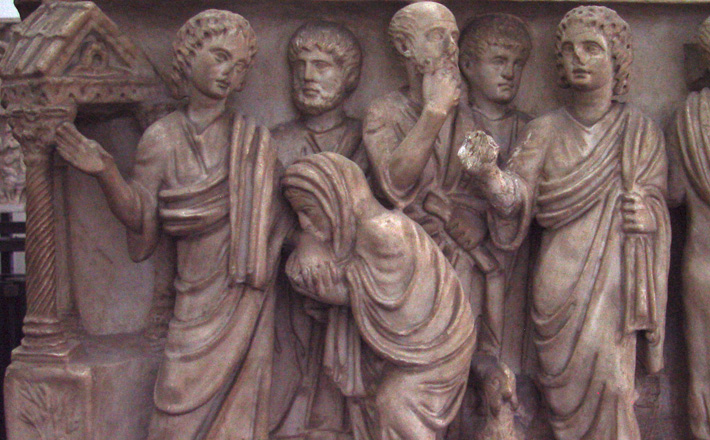Commentary on Jeremiah 1:4-10
Since Jeremiah 1:4-10 functions to introduce and authorize the entire book of Jeremiah, it may be helpful to introduce the range of content in the book, from calls for repentance, to announcements of judgment, to personal laments, to pronouncements against the nations, and finally to stunning announcements of hope, renewal, and recreation.
The call of Jeremiah shapes how we read the entire book. When we have the entire book in mind, we will not read these lectionary verses as a reflection on vocation. We are not urged to “be like” Jeremiah; rather, we are called to listen to Jeremiah. We are not enjoined to admire Jeremiah nor are adolescent “youths” being encouraged to dream beyond their self-perceived deficiencies.
Jeremiah spoke a commanded word, a word placed in his mouth. We don’t need to reduce the metaphorical language to a literalistic caricature with Jeremiah reduced to nothing more than a singing telegraph or a piece of audio equipment playing recordings of God’s words. Jeremiah is not a dispassionate instrument. The words he will be commanded to speak will have an impact on him. In particular, he is not exempt from the dark message he is compelled to speak against his neighbors. There is no “good guy/bad guy” distinction in the book that would result in rewards for the “good guys.” Nobody is rewarded with a little Eden-like island spared from the surrounding plucking up and tearing down of Judah and Jerusalem. In the context of the whole book, building and planting follow being destroyed and overthrown; they are not an exemption from the latter.
“Before I formed you … before you were born, I appointed you a prophet to the nations” (Jeremiah 1:5). “Today I appoint you over nations and kingdoms” (1:10). The temporal span from before birth to the time when Jeremiah was a “boy/youth” underscores the decisiveness of God’s call to Jeremiah. Functionally, the call commences when it is declared to Jeremiah. It starts with the today of this call narrative, the day when Jeremiah says he is too inarticulate and young and God responds with “go,” “speak,” and “do not be afraid.” The today stretches from the 13th year of Josiah to the 11th year of Zedekiah and beyond. Each day of Jeremiah’s prophetic work is a “today-I-appoint-you” day. That appointment is his only authorization and God bears the responsibility for it.
“Today” is restated in Jeremiah 1:18. The effect is similar to the use of “today” in Deuteronomy. To an original audience, it heightens the import of what is said. The message is not a general truism or something that may have applicability at some future point. The “today” pushes beyond the language of moral principles and doctrine. Rather, it has particularity and urgency; there is a present tense “now” at work. The recipient of the message needs to respond immediately, not merely take the message under advisement. At the same time, each future moment is a “now.” Thus, in the case of Jeremiah, “today” covers each day within the span from Josiah to Zedekiah and beyond into the captivity of Jerusalem. Finally, it encompasses subsequent readers centuries later. The book of Jeremiah is a continual present tense proclamation. It is not merely an archival record of past proclamation from which we might derive a few still useful nuggets.
How are these words re-presented to us? Where do we enter as readers and addressees into the dynamic of the text? First, we enter at the point of the captivity of Jerusalem. That is where Jeremiah 1:1-3 leaves off and thus positions the reader. This captivity is not a momentary relenting of the sunshine; it’s not a bit of pain before a gain (to paraphrase an athletic training cliché). As readers we know that any call to repentance was not accepted because we know that the “captivity of Jerusalem in the fifth month” will come before we finish reading the book. Calls for repentance classically lay out alternative futures: if you repent, then the future will be good; if you do not repent, then the future will not be good. There an inherent threat (“or else”) contained in the warnings (see 4:1-4 for instances of these structures). The reader knows that calls for repentance and warnings went unheeded for they did not ward off the “captivity of Jerusalem in the fifth month” (1:3). Undoubtedly we will resist understanding ourselves as already in captivity. We want options that we can exercise; our doctrines of autonomy and free will scream in resistance to starting in captivity. Perhaps the editorial shaping and placement of the call narrative not only shapes our reading posture for the rest of the book but also responds to any potential resistance to the implications of the heading of the book (vss. 1-3).
Second, we are placed before the purpose for which Jeremiah was appointed. As readers who are at the same time addressees of the book of Jeremiah, we are those who are plucked up and pulled down, who are destroyed and overthrown, and who are built and planted. It is not a matter that some are allotted to the first four verbs and others to the last two verbs. Placing the prefix “re-” before the latter two might best capture the mix of these six verbs: rebuilding and replanting. The magnitude, surprise and audacity of “build” and “plant” are lost if they are not embedded in the reality created in the preceding verbs, that is, in the “captivity of Jerusalem.”
An optimistic culture will vehemently resist any suggestion that its projects will be shutdown and disassembled. It will fight against a message of judgment (Jeremiah 1:19). It cannot imagine “build” and “plant” as anything but a ratification of its own prestige and virtues. But in the book of Jeremiah such thinking belongs to Hananiah and other false prophets (see, for example, Jeremiah 28). The first move in the book is to spell out the ramifications of “pluck up,” “pull down,” “destroy,” and “overthrow,” starting with the boiling pot spilling over from the north (Jeremiah 1:13ff.). Such a future is not in the cultural script and therefore is hard to hear. Without hearing and experiencing them, there is no building and planting.
There are other contexts in which “build” and “plant” are equally hard to hear. Words of anger and revenge may be more prominent but such words can also resist the commanded words of the book of Jeremiah. Anger and revenge are not ways to exit the “captivity of Jerusalem.” The exit depends on God “watching over [God’s] word to perform it” (Jeremiah 1:12).
Six verbs are used to summarize the authorized the word of God in the book of Jeremiah. The preaching task today is to discern which verbs need to be represented and reheard in a specific context. As in the book of Jeremiah, different moments will need to hear different commanded words.


August 21, 2016